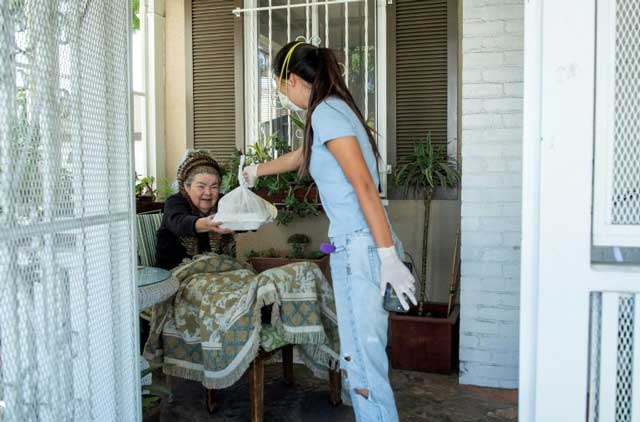
Los Angeles, United States | AFP | A group of teens in the Los Angeles area are paying it forward during the COVID-19 pandemic, making grocery runs for seniors — and learning some life lessons along the way.
“This experience has been really great,” said 16-year-old Mira Kwon as she did a recent supermarket run. “In many ways, it has taught me a lot.”
Kwon volunteers with “Zoomers to Boomers” — a service that originated in California in the wake of the virus outbreak, which prompted stay-at-home orders throughout the United States.
The service has now spread to more than a dozen cities across the country.
Kwon now heads a team of about 40 students whose academic year was abruptly upended because of the pandemic and who were forced to pursue their high school studies online.
The idea behind the service is simple: elderly people (Baby Boomers) or those who are immunocompromised submit a list to association members (Generation Z) who then do the shopping and deliver the groceries.
“I was very intimidated at first because … it required me to cold call a bunch of businesses,” said Kwon, who heads the service’s LA chapter in Koreatown.
“I hadn’t really done that before and I was worried that I would be rejected.”
The teen said although many businesses did not want to partner with the delivery service, she finally found several stores that were interested.
Apart from the satisfaction gained from helping those in need, Kwon said the initiative has helped her build confidence and connect with people.
– ‘Real-world problems’ –
For Betsy Bass, who also volunteers, the experience has been an eye-opener — and taught her a lot than she would never have learned in a traditional classroom.
“One thing that drew me to this experience was all the real world problems I’m going to have to solve,” said the 17-year-old.
A major challenge has been reaching out to those who are in need but who may not have access to computers or social media.
“We have reached out to neighborhood councils, church groups, synagogues, senior homes, newspapers and that’s how we were really able to spread the word in the community,” Bass said.
Once the coronavirus crisis is over, some of the teenagers said they would still like to continue with the project.
“Even if we’re not in the midst of a global pandemic, there are still families that can’t afford to have a meal on the table three times a day,” said Bass.
“So I think that could be something that we carry over in the future and even pass along to our siblings when we graduate.”
 The Independent Uganda: You get the Truth we Pay the Price
The Independent Uganda: You get the Truth we Pay the Price





